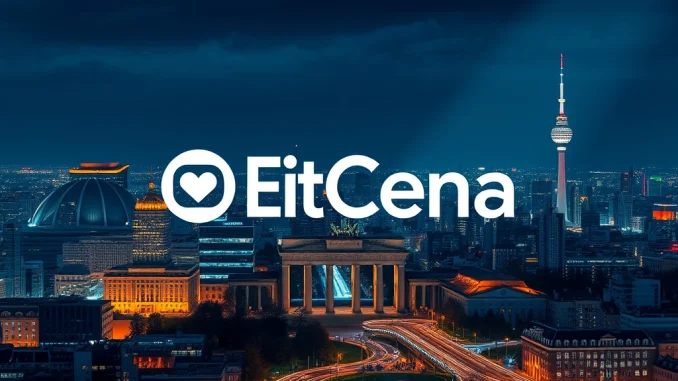
In a surprising turn of events, Ethena Labs, the innovative force behind the USDe stablecoin, has announced its departure from Germany, simultaneously ceasing its efforts to secure a Markets in Crypto-Assets (MiCAR) license. This move, revealed via an X post, marks a significant shift in Ethena’s regulatory strategy and geographical focus. For those closely watching the crypto space, especially the evolution of stablecoins and regulatory landscapes, this development raises critical questions about Ethena’s future direction and the broader implications for crypto businesses operating within and outside of Europe.
Why Did Ethena Exit Germany and Abandon MiCAR?
Ethena Labs stated that as of March 21st, all operations related to USDe have been managed by its entity in the British Virgin Islands (BVI). Crucially, they clarified that Ethena GmbH, their German subsidiary, has no ongoing users or operational activities. This suggests a strategic decision to centralize operations in a jurisdiction perceived as more favorable or perhaps less stringent in its regulatory approach compared to Germany, especially concerning the impending MiCAR regulations.
Let’s break down the key aspects of this development:
- Operational Shift: The complete transfer of USDe operations to the BVI entity indicates a decisive move away from German jurisdiction. This is not merely a partial relocation but a full cessation of activities within Germany.
- MiCAR License Abandonment: Dropping the pursuit of a MiCAR license is a noteworthy decision. MiCAR is poised to become a landmark regulatory framework for crypto-assets in the European Union. Ethena’s withdrawal suggests a possible reassessment of the costs and benefits of MiCAR compliance, or perhaps a strategic pivot away from targeting the EU market directly through a German entity.
- Timing and Context: The announcement comes as the crypto industry globally grapples with evolving regulatory landscapes. MiCAR, in particular, is a significant development for European crypto regulation, aiming to provide a harmonized legal framework across EU member states.
Understanding MiCAR and Its Significance for Crypto Firms like Ethena
The Markets in Crypto-Assets (MiCAR) regulation is a comprehensive EU framework designed to regulate crypto-assets, issuers of crypto-assets, and crypto-asset service providers (CASPs). It aims to bring clarity and consumer protection to the crypto market within the EU. For stablecoin issuers like Ethena, MiCAR introduces specific requirements concerning reserve assets, operational robustness, and investor protection.
Key aspects of MiCAR relevant to stablecoin issuers:
| Feature | Description | Implications for Stablecoin Issuers |
|---|---|---|
| Authorization and Licensing | Issuers of significant stablecoins (like those potentially pegged to major currencies or with a large market cap) need to be authorized as credit institutions or obtain a crypto-asset service provider license. | Requires significant compliance efforts and potential capital reserves to meet regulatory standards. |
| Reserve Requirements | Stablecoin issuers must maintain reserves to cover claims from holders. These reserves must be of high quality and sufficiently liquid, with operational segregation and supervision. | Impacts the operational and financial structure of stablecoin issuers, necessitating robust reserve management. |
| Operational Requirements | Robust governance arrangements, cybersecurity measures, and business continuity plans are mandated. | Demands a high level of operational maturity and investment in security and risk management. |
| Consumer Protection | Rules on transparency, disclosures, and handling of complaints are designed to protect consumers. | Increases transparency and accountability, enhancing trust but also requiring procedural adjustments. |
For Ethena, pursuing a MiCAR license through its German subsidiary would have meant navigating these complex requirements. The decision to withdraw suggests a strategic recalculation, potentially weighing the costs of compliance against the perceived benefits of operating under MiCAR within Germany.
What Could Be Ethena’s Strategy Post-Germany Exit?
Ethena’s move away from Germany and MiCAR pursuit prompts speculation about their future strategy. Several possibilities emerge:
- Focus on Non-EU Markets: By consolidating operations in the BVI, Ethena might be prioritizing markets outside the European Union where regulatory frameworks are currently less defined or perceived as more lenient. This could allow for greater operational flexibility in the short term.
- Re-evaluation of Regulatory Approach: The exit could indicate a broader re-evaluation of Ethena’s regulatory strategy. They might be considering alternative jurisdictions within or outside the EU that offer a more suitable regulatory environment for their specific business model.
- Strategic Partnerships: Ethena might be exploring partnerships with entities already licensed or operating within MiCAR-compliant jurisdictions, rather than seeking direct licensing themselves. This could allow them to access the EU market indirectly while mitigating direct regulatory burdens.
- Product Diversification: While USDe is their flagship product, Ethena Labs may be considering diversifying their product offerings to navigate regulatory complexities. This could involve exploring products that fall under different regulatory classifications or are less sensitive to MiCAR requirements.
Impact on USDe Stablecoin and the Broader Stablecoin Landscape
Ethena’s decision has implications for its USDe stablecoin and the broader stablecoin market. USDe is known for its “synthetic dollar” approach, utilizing delta-neutral strategies with derivatives to maintain its peg. Regulatory scrutiny on stablecoins is increasing globally, and MiCAR represents a significant step in this direction within Europe.
Potential impacts and considerations:
- Market Perception: The withdrawal from Germany and MiCAR pursuit could be interpreted in various ways by the market. Some might see it as a strategic retreat from stringent regulation, while others might view it as a pragmatic business decision to optimize operations.
- Regulatory Clarity vs. Flexibility: Operating outside of MiCAR’s direct purview may offer Ethena greater operational flexibility in the short term. However, it also means foregoing the potential benefits of regulatory clarity and market access that MiCAR compliance could provide within the EU.
- Future EU Strategy: Ethena’s current exit from Germany doesn’t necessarily preclude a future re-entry into the EU market. They may re-evaluate their approach as MiCAR implementation progresses and the regulatory landscape becomes clearer.
- Competitive Dynamics: The stablecoin market is highly competitive. Ethena’s strategic shifts will be closely watched by competitors and could influence the dynamics of stablecoin adoption and regulatory strategies within the industry.
The Road Ahead for Ethena and Crypto Regulation
Ethena’s strategic pivot away from Germany and MiCAR license pursuit is a stark reminder of the evolving and often complex interplay between cryptocurrency innovation and global regulation. As the crypto industry matures, navigating diverse regulatory landscapes becomes a crucial aspect of business strategy. Ethena’s decision will undoubtedly be a case study for other crypto firms contemplating their regulatory pathways, especially in the context of landmark frameworks like MiCAR.
For investors and users of USDe, it remains essential to stay informed about Ethena’s operational and regulatory updates. The broader crypto community will be keenly observing how Ethena’s strategy unfolds and what implications it holds for the future of stablecoins and cross-border crypto operations in a world increasingly shaped by regulatory considerations.
Key Takeaways: Ethena’s Strategic Shift
- Strategic Realignment: Ethena Labs is strategically realigning its operations by exiting Germany and ceasing its MiCAR license pursuit.
- Focus on BVI Entity: All USDe activities are now centralized under Ethena’s British Virgin Islands entity, indicating a shift away from German/EU jurisdiction.
- MiCAR Implications: The decision highlights the complexities and strategic choices crypto firms face when navigating new regulatory frameworks like MiCAR.
- Future Strategy Unclear: Ethena’s future strategy in relation to the EU market and regulatory compliance remains to be seen, opening up various possibilities from focusing on non-EU markets to exploring strategic partnerships.
- Broader Industry Impact: Ethena’s move serves as a significant case study for the crypto industry, illustrating the ongoing navigation of global regulatory landscapes and strategic adaptations required for sustained growth and market access.



